| All Artists: Manuel Mendes, Anonymous, Gabriel Diaz Besson, Gregorian Chant, Tomas Luis de Victoria, Francisco Antonio de Almeida, Alonso Lobo, Juan de Esquivel Barahona, Giovanni Giorgi, Fernando de Almeida, Giovanni Pierluigi da Palestrina, Joao Lourenco Rebelo, Gines de Morata, Juan de Castro y Malagaray, Owen Rees, A Capella Portuguesa, Stephen Farr Title: Music for Holy Week at the Chapel of the Dukes of Braganza Members Wishing: 0 Total Copies: 0 Label: Hyperion UK Release Date: 10/22/1996 Album Type: Import Genres: Special Interest, Classical Styles: Opera & Classical Vocal, Chamber Music, Historical Periods, Baroque (c.1600-1750), Classical (c.1770-1830), Early Music, Sacred & Religious Number of Discs: 1 SwapaCD Credits: 1 UPC: 034571168678 |
Search - Manuel Mendes, Anonymous, Gabriel Diaz Besson :: Music for Holy Week at the Chapel of the Dukes of Braganza
 | Manuel Mendes, Anonymous, Gabriel Diaz Besson Music for Holy Week at the Chapel of the Dukes of Braganza Genres: Special Interest, Classical |
Larger Image |
CD Details |
CD ReviewsVery Enjoyable Issue. B. Marold | Bethlehem, PA United States | 12/31/2005 (5 out of 5 stars) "'Music for Holy Week at the Chapel of the Dukes of Braganza, c1735' is liturgical music done in Latin by A Capella Portuguesa. While I am very fond of both liturgical choral music and 'early music', I clearly do not have the technical experience of the other reviewer for this piece. I can only give my visceral reaction that compared to many similar works I have heard, this is near the top of the list in historical interest and performance quality. After reading the other review, I confess I did sense a certain flatness in the sound which encourages me to look up the other recording which may be a lot better. At any rate, I was not disappointed with this recording and it is a regular item on my Eastertime listening." A mild letdown compared to its companion volume R. J. Stove | Gardenvale, Victoria Australia | 09/28/2004 (4 out of 5 stars) "As almost always with Hyperion, so with this issue: we have a splendidly enterprising choice of repertory (good luck trying to find any alternative recordings of any composers represented here, except of course Palestrina and Victoria), high performance standards, and obvious musicological expertise in the booklet notes. Yet the result is a mild letdown compared with the companion volume, MUSIC FROM RENAISSANCE COIMBRA (CDA66735).
The main problem is that something went badly wrong with balances. Various polyphonic lines in these pieces have been assigned - as customarily happened in Iberian performances of sacred compositions during the 16th and 17th centuries - to instruments: in this case, organ and harp. Clearly Owen Rees and his very gifted forces wanted the non-vocal contributions, however tactful, to be heard without effort. Unfortunately they can't be, even when straining your headphone-wearing ears to the utmost (and as for trying to detect more than the occasional glint of organ or harp tone through speakers, forget it). You need to consult the booklet in order to determine whether the instrumentalists are playing at all. Why? Inept microphone placements? Bizarre post-production whims? Given Hyperion's normally purist approach to recorded sound, the former seems more probable than the latter. Whatever the cause, it mars an otherwise commendable record." |
